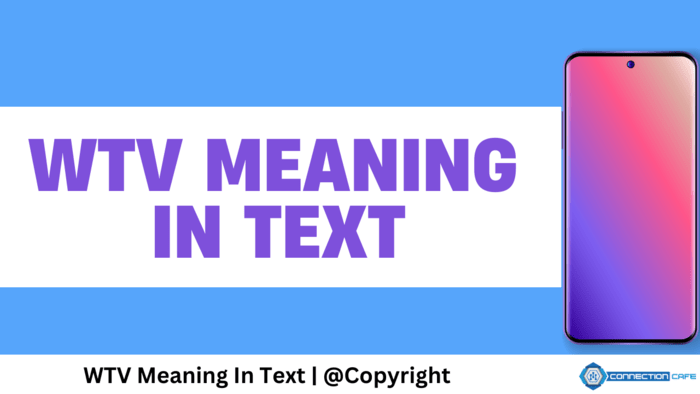Received a message with “WTV” and feeling puzzled? No need to worry, you’ll understand it soon! This article will explain the meaning of WTV, how to use it, and how to respond to someone who sends you a message with WTV.
What does WTV stand for on Snapchat?
On Snapchat, “WTV” is an abbreviation for “whatever.” Snapchat prioritizes quick communication, so spelling out “whatever” completely isn’t practical. “WTV” can be used in any context where you normally use “whatever.”
It also holds the same meaning on Instagram, Facebook, and TikTok, with no differences between platforms. For instance, a message might read:
- I’m down for WTV you wanna do.
- It’s WTV.
- WTV. Don’t worry about it.
What does WTV mean in texting?
“WTV” is an abbreviation for “whatever” in texting as well. The meaning of this acronym remains consistent outside of social media, so if someone uses “WTV” in a text conversation, it still means “whatever.” There is no distinction between “WTV,” “Wtv,” or “wtv.”
How is WTV used?
Use “WTV” to express apathy or indifference. Typically, “whatever” is used to show a relaxed attitude. You might send “WTV” to appear casual when you don’t want to seem too enthusiastic, or to indicate that you don’t particularly care. For example:
Them: “Do you want Italian or Indian tonight?”
You: “WTV! I could go for anything.”
Them: “Do you like Marvel movies?”
You: “They’re WTV.”
Them: “What do you want to do tonight?”
You: “WTV. I don’t have strong feelings about it.”
Send “WTV” to indicate a wide range of options.
“Whatever” can also suggest multiple possibilities! This is a casual way to highlight that someone has many choices (or that the choice isn’t particularly crucial, but in a positive way). Examples include:
Them: “We can either write an essay or shoot a video for Mr. Johnson’s homework, right?”
You: “Yup! WTV you want to do. You can even make a diorama.”
Them: “Are we required to show up at 7 pm exactly?”
You: “Nah, it’s WTV. Show up when you want.”
Them: “Is there an itinerary for this weekend?”
You: “Nope. You can do WTV your heart desires!”
Use “WTV” to brush off someone who is annoying you.
If someone is bothering you and you want to subtly dismiss them without being too direct, “WTV” can serve as a discreet way to do so. For example:
Them: “I really don’t get why you won’t apologize.”
You: “Fine, WTV. Sry.”
Them: “Can I come to your house in an hour? I’m bored.”
You: “WTV.”
Them: “You haven’t congratulated me on my first date haha.”
You: “Look, it’s WTV. I don’t care.”
What is the appropriate reply to WTV?
If “whatever” isn’t sufficient information for you, feel free to seek clarification.
When someone uses “WTV” in a conversation and you need more specific details or a definite response, it’s okay to ask for clarification.
Sometimes people use “whatever” to indicate they’re indifferent or to let you decide. If that doesn’t work for you, express your need for clarity. For instance:
You: “Do you want to go to New York with me this summer?”
Them: “WTV. I’m down.”
You: “No, seriously. I’m planning the trip right now. Do you want to go?”
Express gratitude if they’ve responded to your inquiry.
If you asked a question and the other person answered with “WTV,” acknowledge their response and move forward. For instance:
You: “Hey, can I pay you back on Friday when I get paid?”
Them: “WTV works for you.”
You: “Great, I appreciate your flexibility.”
If “WTV” seems like the natural conclusion to the conversation, further response may not be needed.
For example:
You: “Can we talk later this week? I’m super busy today.”
Them: “WTV works for you!”
Other meanings of WTV
Sometimes, “WTV” can mean “what’s the verdict?” This is a way of asking if a decision has been made. Usually, the person is seeking your choice or decision, so feel free to take charge in responding. For example:
- Are we going out tonight or staying in? WTV?
- WTV? Are we car shopping today or not?
- Are we getting Indian or Mexican food tonight? WTV?
“What’s the vibe” is about the general mood or atmosphere. A positive vibe might involve enjoying the sun with upbeat friends, while a negative one could mean an awkward party or uncomfortable social interaction.
When someone uses “WTV” to ask how an event or night out is going, they typically check in on the vibe. For example:
- You at Randy’s place? WTV over there?
- I’m at O’Callaghan’s Pub, but it’s slow. WTV at Smith’s?
- Hey, WTV for dinner tonight? Dressing up or staying casual?

